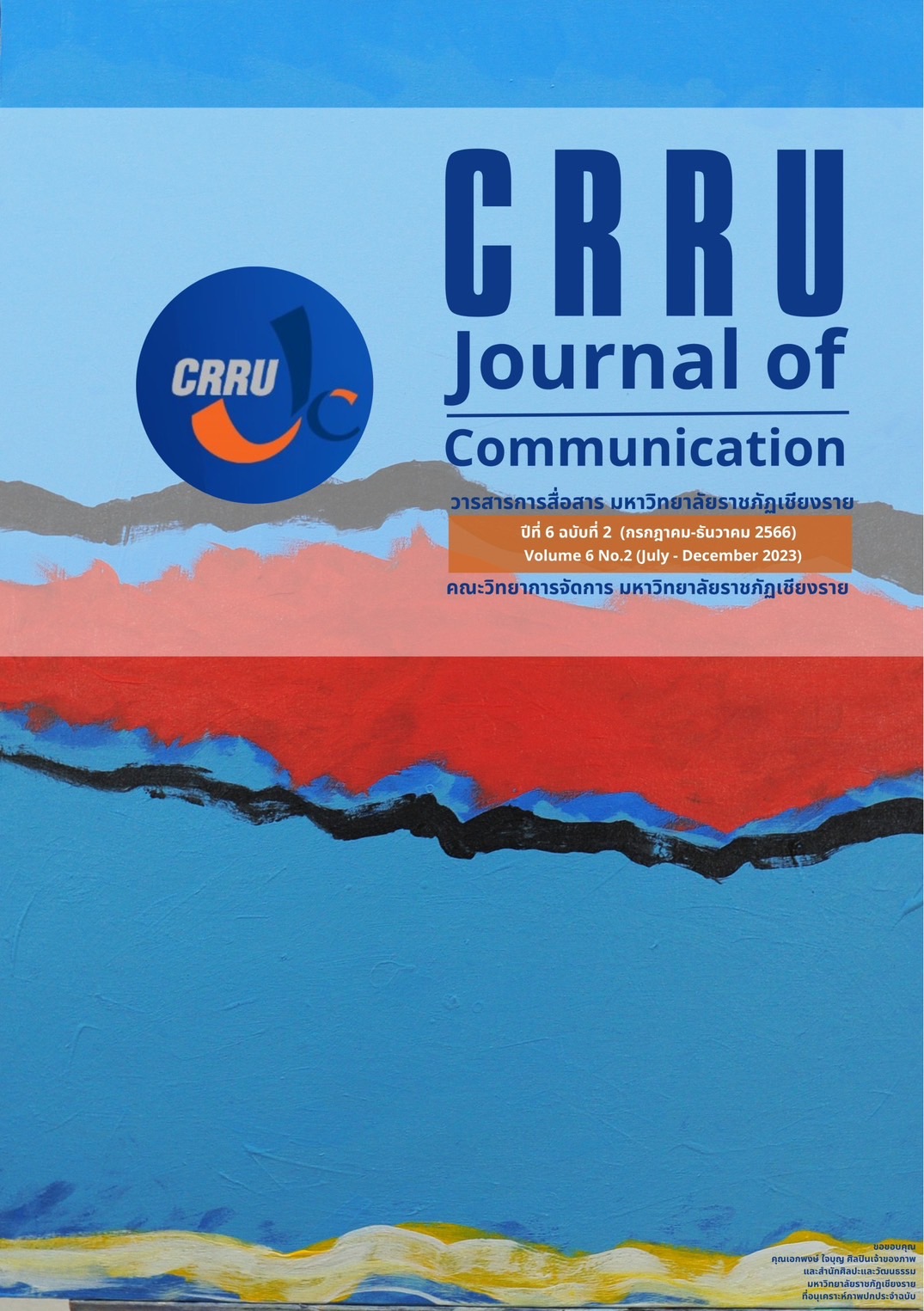Branding of Agricultural Tourism Destinations Suphattraland Park, Rayong Province
Main Article Content
Abstract
The purpose of this research is to study the process of branding the agricultural tourism destination of Suphattra Land Park, Rayong Province. It is a qualitative research using content analysis, participatory field visits and in-depth interviews with 3 groups of informants: 4 entrepreneurs and employees, personnel from government agencies involved in tourism promotion, 4 agricultural workers and 15 Thai tourists visiting Suphattra Land Park.
The research results found that Suphattra Land Park has a process for building tourist attraction brands in line with the concepts of Morgan and Pritchard and Word Tourism organizations and European travel commission (2009), all 10 steps, with the steps that Suphattra Land Park gives the most importance to: Brand Performance Audit by checking from receiving the award of tourist attractions for learning Organized by the Tourism Authority of Thailand. The less important step is analyzing competitors because Suphattra Land sees itself as the country's first agricultural tourism destination and the largest which is difficult for competitors to imitate. In addition, with the essence of an agricultural tourism destination in the form of fruit orchards with seasonal restrictions, Suphattra Land Park has created a brand as a learning tourist destination. As for the process of creating an agricultural tourism destination brand that is different from creating a brand for other types of products, that is, the process of consulting with stakeholders. Suan Suphattra Land gives importance to farmers; government agencies and travel management agencies to work in a collaborative manner.
Article Details
References
กรมการท่องเที่ยว. (2561). แผนยุทธศาสตร์พัฒนาการท่องเที่ยว พ.ศ. 2561 – 2564 ของกรมการท่องเที่ยว. กรุงเทพฯ: วีไอพี ก็อปปี้ปริ้น.
กาญจนา กาแก้ว. (2558). พฤติกรรมการท่องเที่ยวเชิงเกษตรของนักท่องเที่ยวชาวไทยที่สวนเกษตร จังหวัดระยอง. (วิทยานิพนธ์ศิลปศาสตรมหาบัณฑิต). มหาวิทยาลัยธุรกิจบัณฑิตย์. กรุงเทพมหานคร.
การท่องเที่ยวแห่งประเทศไทย. (2565). ททท.จัดแคมเปญ We Love Local สร้างรายได้ชุมชนละล้านใน 1 ปี. สืบค้นจาก https://www.industrybiznews.com/
จุฑามาศ มีชัย. (2557). การพัฒนาพื้นที่เกษตรไปสู่แหล่งท่องเที่ยวเชิงเกษตร กรณีศึกษาพื้นที่เกษตรตำบลตะพง อำเภอเมือง จังหวัดระยอง. (วิทยานิพนธ์รัฐประศาสนศาสตรมหาบัณฑิต). มหาวิทยาลัยบูรพา. ชลบุรี.
ชมพูนุช ปัญไพโรจน์. (2559). โครงการการสร้างตราสินค้าแหล่งท่องเที่ยวแห่งประเทศไทย. ชลบุรี: มหาวิทยาลัยบูรพา.
ชลธิชา พันธ์สว่าง, เสรี วงษ์มณฑา, ชวลีย์ ณ ถลาง และ กาญจน์นภา พงศ์พนรัตน์. (2563). การจัดการการตลาดเพื่อส่งเสริมการท่องเที่ยวเชิงเกษตรในจังหวัดราชบุรี. วารสารสมาคมนักวิจัย, 25(3), 129-146.
เดชา โต้งสูงเนิน. (2543). การบริหารจัดการการท่องเที่ยวเกษตร กรณีศึกษาบ้านม่วงคํา ตําบลโป่งแยง อําเภอแม่ริม จังหวัดเชียงใหม่. (การค้นคว้าอิสระบริหารธุรกิจมหาบัณฑิต สาขาวิชาบริหารธุรกิจ). มหาวิทยาลัยเชียงใหม่. เชียงใหม่.
เดลินิวส์ออนไลน์. (2560). ระยองเปิดแหล่งท่องเที่ยวเชิงเกษตร สัมผัสวิถีชีวิตชาวสวนผลไม้. สืบค้นจาก https://d.dailynews.co.th/article/581567/
ทักษิณ รักจริง. (2564). โมเดลการส่งเสริมและพัฒนาการท่องเที่ยวเชิงเกษตรขององค์กรปกครองส่วนท้องถิ่น. วารสารมานุษยวิทยาเชิงพุทธ, 6(5), 408-424.
นิลาวัลย์ อินทคง, สุพัตรา ศรีสุวรรณ และ สุรินทร์ นิยมางกูร. (2562). ความพึงพอใจของนักท่องเที่ยวที่มีต่อแหล่งท่องเที่ยวเชิงเกษตร ตําบลวังอ่าง อําเภอชะอวด จังหวัดนครศรีธรรมราช. วารสาร มจร มนุษยศาสตร์ปริทรรศน์, 5(2), 83-92.
ปัญญาดา นาดี. (2561). การพัฒนาการท่องเที่ยวเชิงเกษตรสู่ความยั่งยืน. วารสารมหาวิทยาลัยอิสเทิร์นเอเชีย ฉบับสังคมศาสตร์และมนุษยศาสตร์, 8(2), 113-124.
เปรมปรีดา ทองลา และ เพ็ญศิริ สมารักษ์. (2363). ศักยภาพการจัดการแหล่งท่องเที่ยวเชิงเกษตร จังหวัดจันทบุรี. วารสารมนุษยศาสตร์และสังคมศาสตร์ มหาวิทยาลัยอุบลราชธานี, 11(1), 190-213.
พยอม ธรรมบุตร. (2562). แนวทางการพัฒนาตราสินค้าท่องเที่ยวเชิงวัฒนธรรม 4.0 ในชุมชนบางกอกใหญ่กรุงเทพมหานคร. วารสารวิชาการมหาวิทยาลัยราชภัฏศรีสะเกษ, 13(2), 83-101.
พิณรัตน์ มะวิญธร. (2554). การศึกษาศักยภาพในการดึงดูดนักท่องเที่ยวชาวรัสเซียจังหวัดระยอง กรณีศึกษาสวนสุภัทราแลนด์. (วิทยานิพนธ์ศิลปศาสตรมหาบัณฑิต). มหาวิทยาลัยธรรมศาสตร์. กรุงเทพมหานคร.
รางวัลกินรี. (2564). ททท.มอบรางวัล “กินรี” ต้อนรับเปิดประเทศ การันตีแหล่งท่องเที่ยวของไทยมีมาตรฐาน. สืบค้นจาก https://www.thairath.co.th/news/local/2232526
สัจจา ไกรศรรัตน์ และคณะ. (2560). กระบวนการสร้างตราสินค้าให้กับตลาดชุมชนโบราณ ลุ่มน้ำสุพรรณบุรีในฐานะของแหล่งท่องเที่ยว. วารสารมนุษยสังคมปริทัศน์, 19(2), 35-48.
สำนักงานเกษตรและสหกรณ์การเกษตรจังหวัดระยอง. (2564). จังหวัดระยองจัดกระตุ้นท่องเที่ยวหลังโควิด ชูท่องเที่ยวเชิงเกษตร กินทุเรียนก่อนใคร ไประยอง. สืบค้นจาก https://www.ryt9.com/s/prg/3213972
สำนักงานส่งเสริมการจัดการประชุมและนิทรรศการ. (2564). แนวคิดใหม่กับการสร้างตราสินค้าให้จุดหมายปลายทางการท่องเที่ยว. สืบค้นจาก https://intelligence.businesseventsthailand.com/en/blog/pata-blog-ep1
อนัญญา ปาอนันต์. (2560). การส่งเสริมการท่องเที่ยวเชิงเกษตร จังหวัดระยอง. (วิทยานิพนธ์ศิลปศาสตรมหาบัณฑิต). มหาวิทยาลัยธุรกิจบัณฑิตย์. กรุงเทพมหานคร.
Kuehn, D., Hilchey, D., Ververs, D., Dunn, K. L., and Lehman, P. (2000). Considerations for Agritourism Development. Retrieved from www.verderiverinstitute.org
Line Shopping. (2563). Line shopping มุ่งสู่ตลาด อีคอมเมิร์ซ. Retrieved from https://marketeeronline.co/archives/196533
Morgan, N., and Pritchard, A. (2010). Destination branding: Creating the unique destination proposition. Oxford: Elsevier Ltd.
World Tourism Organization and European Travel Commission. (2009). Handbook on tourism destination branding. Madrid: World Tourism Organization.


